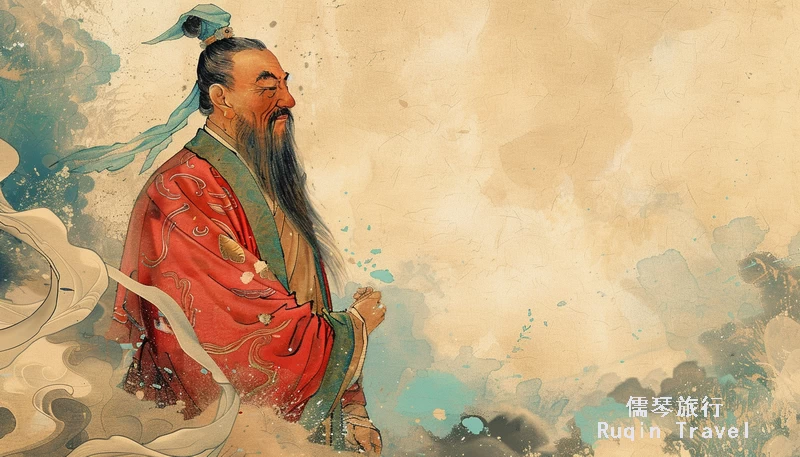Confucius Philosophy is one of the most influential philosophies in Chinese history. When visiting China, it’s essential to understand the cultural and philosophical heritage that shapes the nation. Founded by Confucius, this philosophy has permeated Chinese society for centuries.
In this article, we’ll explore the core principles of Confucianism, its historical impact, and its relevance in modern China. By the end, you’ll have a deeper appreciation for the teachings of Confucius and their significance in Chinese culture.
Who Was Confucius?
Confucius, known as Kong Fuzi in Chinese, was a philosopher and educator who lived from 551 to 479 BCE. He was born in the state of Lu, in present-day Shandong Province.
Despite his humble beginnings, Confucius became one of China’s most revered thinkers. His ideas focused on morality, social relationships, and justice. As you explore China, you’ll often encounter references to Confucius and his teachings.
The Core Teachings of Confucius
At the heart of Confucianism are several key concepts. These include Ren (benevolence), Li (proper conduct), and Xiao (filial piety).
Ren emphasizes kindness and empathy towards others. Li refers to the importance of rituals and manners. Xiao stresses respect and care for one’s parents and ancestors. Together, these principles form the foundation of Confucian ethics.
Ren: The Essence of Humanity
Ren, often translated as “benevolence” or “humaneness,” is central to Confucian thought. It represents the ideal relationship between individuals, based on mutual respect and compassion.
Confucius believed that practicing Ren would lead to a harmonious society. For example, treating others with kindness and respect fosters positive relationships. As you travel through China, you’ll notice that this emphasis on respect and courtesy is still prevalent.
Xiao: Filial Piety
Xiao, or “filial piety,” underscores the importance of respecting one’s parents and ancestors. Confucius placed great importance on family relationships. He believed that harmony in the family would extend to society at large.
In modern China, the value of Xiao remains strong. You might see it in the care given to elders or the reverence for ancestral heritage. This respect for family ties is a vital aspect of Chinese culture.
The Analects of Confucius
The Analects is a collection of sayings and ideas attributed to Confucius and his disciples. This text is a primary source for understanding Confucian philosophy.
The Analects cover various topics, including governance, education, and personal conduct. By reading the Analects, you can gain direct insight into Confucius’s thoughts and teachings. Many quotes from the Analects are still relevant today, reflecting timeless wisdom.
Confucianism and Its Influence on Chinese Society
Confucius Philosophy has profoundly influenced Chinese society for over two millennia. It shaped the development of Chinese political systems, education, and social norms.
Confucius’s emphasis on moral integrity and ethical governance impacted how Chinese leaders ruled. Additionally, Confucianism’s focus on education led to the establishment of state-sponsored schools. As you explore China, you’ll see how these influences remain evident in contemporary practices.
Confucian Values in Modern China
Despite the modernization and rapid development, Confucian values still resonate in modern China. Concepts such as respect for authority, emphasis on education, and strong family bonds are deeply ingrained.
In workplaces, hierarchical structures often reflect Confucian principles. Similarly, educational success is highly valued, mirroring Confucius’s advocacy for lifelong learning. As a visitor, understanding these values can help you navigate social interactions more effectively.
Visiting Confucius Temples
China is home to many temples dedicated to Confucius, where you can explore his legacy. The most famous is the Confucius Temple in Qufu, his birthplace. This UNESCO World Heritage site includes the temple, cemetery, and family mansion.
Visiting these sites offers a glimpse into the historical and cultural significance of Confucius. Additionally, you’ll find Confucius temples in major cities like Beijing and Shanghai, each with unique features.
Confucius Philosophy for Visitors
As a visitor, appreciating Confucianism can enrich your experience in China. Understanding the philosophy helps you connect with the local culture on a deeper level.
For instance, practicing respect and courtesy aligns with Confucian values. Engaging in traditional rituals, such as bowing or offering gifts, can show your respect for local customs. By embracing these principles, you’ll find your interactions more meaningful and rewarding.
Confucius’s Influence on Chinese Education
Confucius emphasized the importance of education and self-cultivation. He believed that everyone should strive for personal and intellectual growth. This belief led to the establishment of a meritocratic system in ancient China, where civil service exams determined government positions.
Today, China’s educational system still reflects Confucian ideals. The rigorous focus on academics and respect for teachers are testament to Confucius’s lasting impact.
Confucian Ethics and Governance
Confucius advocated for ethical governance based on moral integrity. He believed that rulers should lead by example, embodying virtues such as honesty and compassion. This idea influenced the development of Chinese political philosophy.
Even today, the concept of a “virtuous leader” resonates in Chinese political thought. Understanding this can provide context for China’s historical and current governance structures.
Confucianism and Chinese Art
Confucianism also influenced Chinese art and literature. Many classical works reflect Confucian themes, such as respect for nature and the importance of moral values. Calligraphy, painting, and poetry often embody Confucian ideals.
Visiting art galleries and museums in China, you’ll see how these principles are woven into the fabric of artistic expression. This blend of philosophy and art enriches the cultural landscape of China.
Confucianism in Daily Life
Confucian principles permeate daily life in China. From family gatherings to business meetings, these values guide social conduct. Respect, humility, and harmony are central to interactions.
As a visitor, observing these practices can provide valuable insights into Chinese society. Whether dining with a local family or attending a festival, you’ll experience the practical application of Confucius Philosophy.
The Global Impact of Confucianism
Confucianism‘s influence extends beyond China. Many East Asian countries, including Korea, Japan, and Vietnam, have integrated Confucian principles into their cultures. This shared philosophical heritage fosters a sense of regional identity.
As you travel in Asia, recognizing these commonalities can enhance your understanding of the broader cultural context. Additionally, Confucian ideas have found relevance in Western philosophical and ethical discussions.
Confucianism, with its rich history and profound impact, is a cornerstone of Chinese culture. Understanding the philosophy of Confucius offers valuable insights into China’s social norms, governance, and daily life.
As you explore the country, appreciating these principles will deepen your cultural experience. Embrace the wisdom of Confucius, and you’ll find your journey through China more enriching and meaningful. Check out China Cultural Insights for more information.
More China Survival Guide
Prepare for smooth travels with the China Survival Guide, your go-to resource for practical advice on navigating daily life in China. From essential language tips and transportation know-how to safety guidelines and local etiquette.



